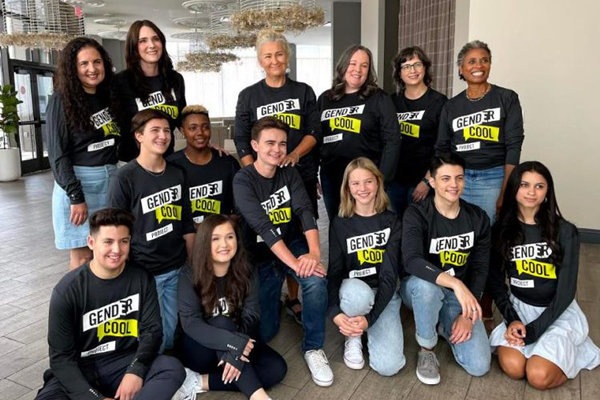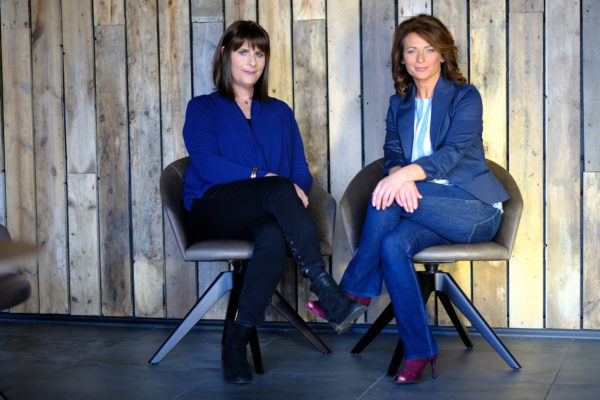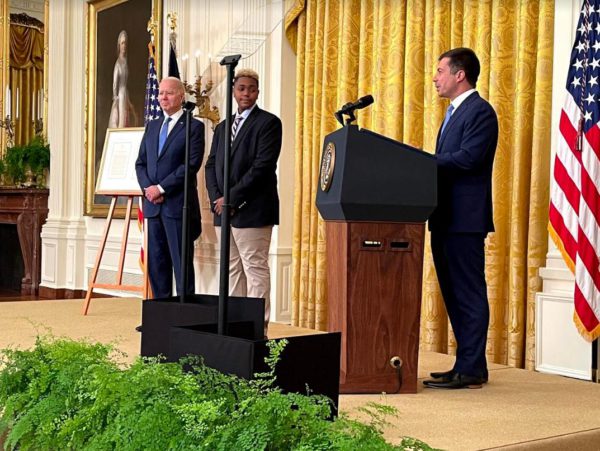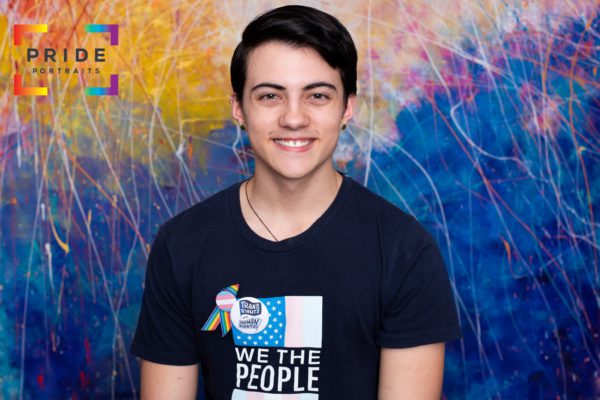National
Exceptional kids, real change, the GenderCool Champions
Youth articulate, poised, intelligent, talented and ambitious

NORTHBROOK, Il. – Imagine being a ‘Mom’ running a frenetic household of four kids juggling all of the tasks one associates with parenting in the modern age. Then add a twist when the youngest begins to emerge from the chrysalis of what appeared as an early traditional childhood gender path transforming over time into a butterfly of the opposite gender.
That sort of metamorphosis presents a myriad of challenges for parents least of which is the emotional acceptance of a reality apart from that envisioned as their child is born. Then comes the added burdens of fear created by a societal and cultural non-acceptance and oft time discriminatory bullying treatment of trans and non-binary identifying youth and the overwhelming need to protect their child from that level of cruelty.
Jen Grosshandler and her husband John faced these challenges as their youngest child, their daughter Chazzie, unfurled her butterfly’s wings for the first time as a proud and out trans youth.
Searching for positive stories and reaching out to their immediate community in suburban Chicago, the Grosshandlers were introduced to Gearah Goldstein. Goldstein is nationally recognized LGBTQ+ Diversity and Inclusion Consultant, a speaker, educator, and trainer on LGBTQ+ issues. But for the Grosshandlers, the key factor was that Goldstein identifies as a fully empowered trans female and best of all- a parent herself.
At about the time the three met and started conversing about offering a path to cast a spotlight on just how amazing transgender and non-binary kids are, the Trump Administration commenced a series of attacks on the Trans community. These attacks included trying to eliminate trans healthcare, the ban on military service by trans Americans, and backing efforts by certain school districts to prevent trans youth from being able to use bathrooms according to their chosen gender.
For the Grosshandlers and Goldstein, greater impetus was placed on the critical need to accentuate the positive of trans and non-binary youth against the backdrop of the attacks by the Trump administration and the unkind attacks by a plethora of rightwing extremist anti-LGBTQ groups. The genesis of what became the GenderCool project was born and the stated goal was to take and redirect the negative into a positive by creating systemic change that will improve the lives of transgender and non-binary young people.

(Not pictured; John Grosshandler. Photo courtesy of GenderCool)
“The strategy we employ is to evolve opinions of decision makers and the general public by showing them that transgender and non-binary young people are remarkable. The GenderCool Champions — youth ages 12-17 — are leaders in their community. They are articulate, poised, intelligent, talented and ambitious young people.
Most importantly, they are thriving, and their ability to connect with the public and key influencers in an exclusively positive way is translating into support and change at every level,” a mission statement from GenderCool reads.
In a phone interview this past weekend with the Blade, Jen Grosshandler chuckled, recalling that “We didn’t have a business plan- no revenue stream, but we did have the motivation and more importantly we had these amazing kids.”
She pointed out that the GenderCool adults felt that there wasn’t enough focus or even concentration on Gender Queer spaces. “It just seemed to me that with of all the negative stories and things said about these kids, one thing stood out and that was 70 to 80% of those being negative had never met a non-binary or Trans kid,” Grosshandler said. “There was fear, awful opinions, but mostly there was just inaccurate information,” she added.
After being handed the phone, Goldstein continued telling the Blade that the fortuitous email exchange between neighbors about kids and transitions, “It was a five page long emailed response to Jen’s neighborhood inquiry,” Goldstein remembered, had led to a dynamic partnership that was breaking through many barriers, particularly for youth in understanding Gender Identity versus sexual identify and orientation.
“There’s a need to not conflate those two and we need to help these young people out by creating awareness of that,” she said and added, “Mostly we are focused on telling their stories, letting people see how amazing they are- they are inspiring and are filled with hope and strength.”
In three and a half years, a “kitchen-table project” has turned GenderCool into a worldwide movement, the idea evolved into concrete actions utilizing data from the Movement Advancement Project (MAP). According to an internal memorandum shared with the Blade by GenderCool, MAP’s data revealed that one of the best ways to build support among the large majority of people in the U.S. for the LGBTQ+ community is to communicate shared values and beliefs. In essence, to show them that transgender and non-binary people and their families are normal and just like theirs.
The best focal point? The positive stories of the amazing youth and their families.
Incorporating a well thought-out and designed website coupled with multi-media and social media campaigns the momentum propelled GenderCool and the Champions into a formidable group with national exposure which included a 23 minute live launch on TODAY with veteran NBC weatherman and anchor Al Roker; NYT, Rolling Stone, ABC News, USA Today, CNN, Forbes, NBC News, Washington Post, MSNBC and other media outlets.
The GenderCool founders managed to create an environment that fostered advocacy and support from corporate America: GenderCool partners include Nike, Dell Technologies, General Mills, NBCUniversal, Intuit, Intel, Indeed, and Bank of America.
All that hard work parlayed into a special invitation from President Joe Biden and First Lady Dr. Jill Biden for the GenderCool Project to attend the first White House celebration of LGBTQ Pride Month since the Obama administration.
Although scaled back due to the coronavirus pandemic, the highlight of the event held in the East Room of the White House was the GenderCool Project’s own Champion Ashton Mota, who was asked to speak about his life and work with GenderCool and then personally introduce the President.
Enriching that moment was Mota himself being introduced by the first openly gay member of a presidential cabinet confirmed by the United States Senate, U.S. Secretary of Transportation Pete Buttigieg.

The focus now is embracing the future and expanding the foundations of the Project while placing the organization on a firm financial footing and a strategic plan for expansion and continuing the mission. GenderCool now has a seat at the table, collaborating with the nation’s leading advocacy organizations including Out & Equal, HRC, NCTE, PFLAG, GLAAD, Lambda Legal and others associated with advancing LGBTQ Equality rights.
Recently though came a boost that will immeasurably assist the GenderCool Project.
The Denver, Colorado based Gill Foundation, one of the largest funders of efforts to secure full equality for LGBTQ people, which has thus far invested more than $390 million in programs and nonprofits across the country working to advance equal rights for LGBTQ people, has bestowed a $500,000 contribution to the GenderCool Project.
“We’re honored to receive this grant from the Gill Foundation. It is a game-changing vote of confidence in our mission to help people understand how talented, driven, and kind transgender and nonbinary youth are, showcasing who they are as remarkable young people,” said the Grosshandlers, and Goldstein. “We’re thrilled that these resources will help us do just that so GenderCool — led by the incredible young people we call Champions — can continue to make an impact changing hearts and minds.”
The stories, the exceptional kids, real change, these are the GenderCool Champions, and now a future for them that looks brighter and more inclusive.

(Photo courtesy of Landon Richie)
U.S. Supreme Court
Supreme Court to consider bans on trans athletes in school sports
27 states have passed laws limiting participation in athletics programs

The U.S. Supreme Court on Thursday agreed to hear two cases involving transgender youth challenging bans prohibiting them from participating in school sports.
In Little v. Hecox, plaintiffs represented by the ACLU, Legal Voice, and the law firm Cooley are challenging Idaho’s 2020 ban, which requires sex testing to adjudicate questions of an athlete’s eligibility.
The 9th U.S. Circuit Court of Appeals described the process in a 2023 decision halting the policy’s enforcement pending an outcome in the litigation. The “sex dispute verification process, whereby any individual can ‘dispute’ the sex of any female student athlete in the state of Idaho,” the court wrote, would “require her to undergo intrusive medical procedures to verify her sex, including gynecological exams.”
In West Virginia v. B.P.J., Lambda Legal, the ACLU, the ACLU of West Virginia, and Cooley are representing a trans middle school student challenging the Mountain State’s 2021 ban on trans athletes.
The plaintiff was participating in cross country when the law was passed, taking puberty blockers that would have significantly reduced the chances that she could have a physiological advantage over cisgender peers.
“Like any other educational program, school athletic programs should be accessible for everyone regardless of their sex or transgender status,” said Joshua Block, senior counsel for the ACLU’s LGBTQ and HIV Project. “Trans kids play sports for the same reasons their peers do — to learn perseverance, dedication, teamwork, and to simply have fun with their friends,” Block said.
He added, “Categorically excluding kids from school sports just because they are transgender will only make our schools less safe and more hurtful places for all youth. We believe the lower courts were right to block these discriminatory laws, and we will continue to defend the freedom of all kids to play.”
“Our client just wants to play sports with her friends and peers,” said Lambda Legal Senior Counsel Tara Borelli. “Everyone understands the value of participating in team athletics, for fitness, leadership, socialization, and myriad other benefits.”
Borelli continued, “The U.S. Court of Appeals for the Fourth Circuit last April issued a thoughtful and thorough ruling allowing B.P.J. to continue participating in track events. That well-reasoned decision should stand the test of time, and we stand ready to defend it.”
Shortly after taking control of both legislative chambers, Republican members of Congress tried — unsuccessfully — to pass a national ban like those now enforced in 27 states since 2020.
Federal Government
UPenn erases Lia Thomas’s records as part of settlement with White House
University agreed to ban trans women from women’s sports teams

In a settlement with the Trump-Vance administration announced on Tuesday, the University of Pennsylvania will ban transgender athletes from competing and erase swimming records set by transgender former student Lia Thomas.
The U.S. Department of Education’s Office for Civil Rights found the university in violation of Title IX, the federal rights law barring sex based discrimination in educational institutions, by “permitting males to compete in women’s intercollegiate athletics and to occupy women-only intimate facilities.”
The statement issued by University of Pennsylvania President J. Larry Jameson highlighted how the law’s interpretation was changed substantially under President Donald Trump’s second term.
“The Department of Education OCR investigated the participation of one transgender athlete on the women’s swimming team three years ago, during the 2021-2022 swim season,” he wrote. “At that time, Penn was in compliance with NCAA eligibility rules and Title IX as then interpreted.”
Jameson continued, “Penn has always followed — and continues to follow — Title IX and the applicable policy of the NCAA regarding transgender athletes. NCAA eligibility rules changed in February 2025 with Executive Orders 14168 and 14201 and Penn will continue to adhere to these new rules.”
Writing that “we acknowledge that some student-athletes were disadvantaged by these rules” in place while Thomas was allowed to compete, the university president added, “We recognize this and will apologize to those who experienced a competitive disadvantage or experienced anxiety because of the policies in effect at the time.”
“Today’s resolution agreement with UPenn is yet another example of the Trump effect in action,” Education Secretary Linda McMahon said in a statement. “Thanks to the leadership of President Trump, UPenn has agreed both to apologize for its past Title IX violations and to ensure that women’s sports are protected at the university for future generations of female athletes.”
Under former President Joe Biden, the department’s Office of Civil Rights sought to protect against anti-LGBTQ discrimination in education, bringing investigations and enforcement actions in cases where school officials might, for example, require trans students to use restrooms and facilities consistent with their birth sex or fail to respond to peer harassment over their gender identity.
Much of the legal reasoning behind the Biden-Harris administration’s positions extended from the 2020 U.S. Supreme Court case Bostock v. Clayton County, which found that sex-based discrimination includes that which is based on sexual orientation or gender identity under Title VII rules covering employment practices.
The Trump-Vance administration last week put the state of California on notice that its trans athlete policies were, or once were, in violation of Title IX, which comes amid the ongoing battle with Maine over the same issue.
New York
Two teens shot steps from Stonewall Inn after NYC Pride parade
One of the victims remains in critical condition

On Sunday night, following the annual NYC Pride March, two girls were shot in Sheridan Square, feet away from the historic Stonewall Inn.
According to an NYPD report, the two girls, aged 16 and 17, were shot around 10:15 p.m. as Pride festivities began to wind down. The 16-year-old was struck in the head and, according to police sources, is said to be in critical condition, while the 17-year-old was said to be in stable condition.
The Washington Blade confirmed with the NYPD the details from the police reports and learned no arrests had been made as of noon Monday.
The shooting took place in the Greenwich Village neighborhood of Manhattan, mere feet away from the most famous gay bar in the city — if not the world — the Stonewall Inn. Earlier that day, hundreds of thousands of people marched down Christopher Street to celebrate 55 years of LGBTQ people standing up for their rights.
In June 1969, after police raided the Stonewall Inn, members of the LGBTQ community pushed back, sparking what became known as the Stonewall riots. Over the course of two days, LGBTQ New Yorkers protested the discriminatory policing of queer spaces across the city and mobilized to speak out — and throw bottles if need be — at officers attempting to suppress their existence.
The following year, LGBTQ people returned to the Stonewall Inn and marched through the same streets where queer New Yorkers had been arrested, marking the first “Gay Pride March” in history and declaring that LGBTQ people were not going anywhere.
New York State Assemblywoman Deborah Glick, whose district includes Greenwich Village, took to social media to comment on the shooting.
“After decades of peaceful Pride celebrations — this year gun fire and two people shot near the Stonewall Inn is a reminder that gun violence is everywhere,” the lesbian lawmaker said on X. “Guns are a problem despite the NRA BS.”
-

 U.S. Supreme Court4 days ago
U.S. Supreme Court4 days agoSupreme Court to consider bans on trans athletes in school sports
-

 Out & About4 days ago
Out & About4 days agoCelebrate the Fourth of July the gay way!
-

 Virginia4 days ago
Virginia4 days agoVa. court allows conversion therapy despite law banning it
-

 Opinions5 days ago
Opinions5 days agoCan we still celebrate Fourth of July this year?










